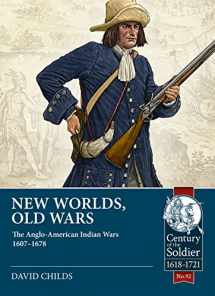
New Worlds, Old Wars: The Anglo-American Indian Wars 1607-1678 (Century of the Soldier)
Book details
Summary
Description
Product Description
From the moment English settlers arrived in the New World they came into contact with the native population, principally because of disputes over land ownership. To assert their rights to the country, which the English had been granted by their king without the consent of the local tribes, the English relied on their more modern weaponry but soon found that bows and arrows and superior tactics, and marksmanship by the Amerindians once they had obtained muskets, made the fighting far more even that the settlers had anticipated.
In the first war, fought in Virginia, and made famous by the several interventions of the Powhatan princess Pocahontas, the English were almost driven out of America and only survived because reinforcements met the fleeing settlers just before they sailed back to England. Besieged behind the wooden walls of Jamestown the English lost far many more people to disease and starvation than were killed in Indian attacks. Following the marriage of Pocahontas to John Rolfe a few years of peace were enjoyed but these came to an abrupt end when the Indians rose up and massacred many of the settlers in 1622. But they did not attack Jamestown and from here a counterattack which included a mass poisoning of the other side during peace-talks the English emerged triumphant.
By 1635 several of the new rival colonies, as well as the Dutch cast covetous eyes over the broad reaches of the Connecticut River. Rather than negotiate a deal with the dominant native tribe, the Pequot, the English used a pretext to march upon the unsuspecting major Pequot settlement at Mystic and massacred the men, women and children sheltered there. They then pursued and slew any survivors who they chanced upon.
In 1675, threatened by land grabs, the Wampanoag leader, King Philip, rose up against the colonists and destroyed several villages. The English in turn, marched against their one-time allies, the much larger Narragansett tribe and, once again, massacred them in their secluded swampland fort.
With most outlying settlements razed to the ground the English were forced to adopt Indian tactics and in Benjamin Church they found a man who adapted and adopted native fieldcraft and became the founder of 'The Rangers'. Church managed to track down and kill Philip and his death brought the war in most of New England to an end. However, in Maine, the Abenaki continued to fight and to win, driving most of the settlers out of their coast-hugging townships. Many of the Abenaki were tricked into surrender and then sold into slavery but by 1678 a treaty was signed that returned land to the Abenaki and the English agreed to pay tribute to the Indians. The failure to honor these arrangements were to lead to six more wars between the two sides.
In the end, the seemingly endless supply of new settlers and replacement weaponry meant the English were destined to win over the land and exterminate the tribes. But while the numbers were more evenly matched the outcome of these wars was very much in doubt.
About the Author
David childs is the author of Tudor Sea Power. He has recently stepped down from the post of Development Director of the Mary Rose Trust, where he was responsible for the new museum.
A frequent lecturer on Tudor naval subjects, he is the author of The Warship Mary Rose and a recognised authority in the field.


We would LOVE it if you could help us and other readers by reviewing the book
Book review



